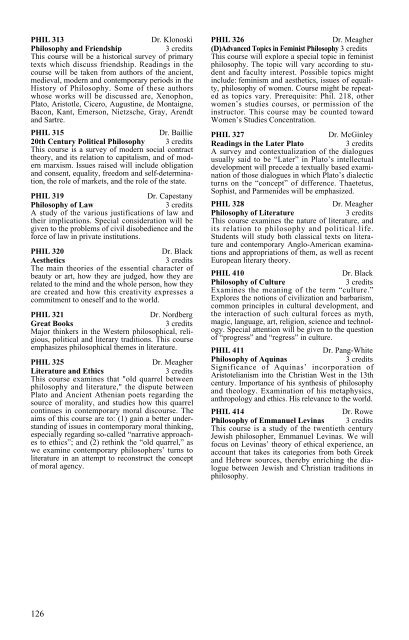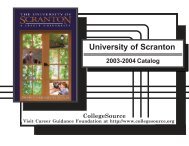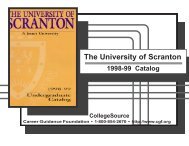Create successful ePaper yourself
Turn your PDF publications into a flip-book with our unique Google optimized e-Paper software.
PHIL 313 Dr. Klonoski<br />
Philosophy and Friendship 3 credits<br />
This course will be a historical survey <strong>of</strong> primary<br />
texts which discuss friendship. Readings in the<br />
course will be taken from authors <strong>of</strong> the ancient,<br />
medieval, modern and contemporary periods in the<br />
History <strong>of</strong> Philosophy. Some <strong>of</strong> these authors<br />
whose works will be discussed are, Xenophon,<br />
Plato, Aristotle, Cicero, Augustine, de Montaigne,<br />
Bacon, Kant, Emerson, Nietzsche, Gray, Arendt<br />
and Sartre.<br />
PHIL 315 Dr. Baillie<br />
20th Century Political Philosophy 3 credits<br />
This course is a survey <strong>of</strong> modern social contract<br />
theory, and its relation to capitalism, and <strong>of</strong> modern<br />
marxism. Issues raised will include obligation<br />
and consent, equality, freedom and self-determination,<br />
the role <strong>of</strong> markets, and the role <strong>of</strong> the state.<br />
PHIL 319 Dr. Capestany<br />
Philosophy <strong>of</strong> Law 3 credits<br />
A study <strong>of</strong> the various justifications <strong>of</strong> law and<br />
their implications. Special consideration will be<br />
given to the problems <strong>of</strong> civil disobedience and the<br />
force <strong>of</strong> law in private institutions.<br />
PHIL 320 Dr. Black<br />
Aesthetics 3 credits<br />
<strong>The</strong> main theories <strong>of</strong> the essential character <strong>of</strong><br />
beauty or art, how they are judged, how they are<br />
related to the mind and the whole person, how they<br />
are created and how this creativity expresses a<br />
commitment to oneself and to the world.<br />
PHIL 321 Dr. Nordberg<br />
Great Books 3 credits<br />
Major thinkers in the Western philosophical, religious,<br />
political and literary traditions. This course<br />
emphasizes philosophical themes in literature.<br />
PHIL 325 Dr. Meagher<br />
Literature and Ethics 3 credits<br />
This course examines that "old quarrel between<br />
philosophy and literature," the dispute between<br />
Plato and Ancient Athenian poets regarding the<br />
source <strong>of</strong> morality, and studies how this quarrel<br />
continues in contemporary moral discourse. <strong>The</strong><br />
aims <strong>of</strong> this course are to: (1) gain a better understanding<br />
<strong>of</strong> issues in contemporary moral thinking,<br />
especially regarding so-called “narrative approaches<br />
to ethics”; and (2) rethink the “old quarrel,” as<br />
we examine contemporary philosophers’ turns to<br />
literature in an attempt to reconstruct the concept<br />
<strong>of</strong> moral agency.<br />
126<br />
PHIL 326 Dr. Meagher<br />
(D)Advanced Topics in Feminist Philosophy 3 credits<br />
This course will explore a special topic in feminist<br />
philosophy. <strong>The</strong> topic will vary according to student<br />
and faculty interest. Possible topics might<br />
include: feminism and aesthetics, issues <strong>of</strong> equality,<br />
philosophy <strong>of</strong> women. Course might be repeated<br />
as topics vary. Prerequisite: Phil. 218, other<br />
women’s studies courses, or permission <strong>of</strong> the<br />
instructor. This course may be counted toward<br />
Women’s Studies Concentration.<br />
PHIL 327 Dr. McGinley<br />
Readings in the Later Plato 3 credits<br />
A survey and contextualization <strong>of</strong> the dialogues<br />
usually said to be “Later” in Plato’s intellectual<br />
development will precede a textually based examination<br />
<strong>of</strong> those dialogues in which Plato’s dialectic<br />
turns on the “concept” <strong>of</strong> difference. Thaetetus,<br />
Sophist, and Parmenides will be emphasized.<br />
PHIL 328 Dr. Meagher<br />
Philosophy <strong>of</strong> Literature 3 credits<br />
This course examines the nature <strong>of</strong> literature, and<br />
its relation to philosophy and political life.<br />
Students will study both classical texts on literature<br />
and contemporary Anglo-American examinations<br />
and appropriations <strong>of</strong> them, as well as recent<br />
European literary theory.<br />
PHIL 410 Dr. Black<br />
Philosophy <strong>of</strong> Culture 3 credits<br />
Examines the meaning <strong>of</strong> the term “culture.”<br />
Explores the notions <strong>of</strong> civilization and barbarism,<br />
common principles in cultural development, and<br />
the interaction <strong>of</strong> such cultural forces as myth,<br />
magic, language, art, religion, science and technology.<br />
Special attention will be given to the question<br />
<strong>of</strong> “progress” and “regress” in culture.<br />
PHIL 411 Dr. Pang-White<br />
Philosophy <strong>of</strong> Aquinas 3 credits<br />
Significance <strong>of</strong> Aquinas’ incorporation <strong>of</strong><br />
Aristotelianism into the Christian West in the 13th<br />
century. Importance <strong>of</strong> his synthesis <strong>of</strong> philosophy<br />
and theology. Examination <strong>of</strong> his metaphysics,<br />
anthropology and ethics. His relevance to the world.<br />
PHIL 414 Dr. Rowe<br />
Philosophy <strong>of</strong> Emmanuel Levinas 3 credits<br />
This course is a study <strong>of</strong> the twentieth century<br />
Jewish philosopher, Emmanuel Levinas. We will<br />
focus on Levinas’ theory <strong>of</strong> ethical experience, an<br />
account that takes its categories from both Greek<br />
and Hebrew sources, thereby enriching the dialogue<br />
between Jewish and Christian traditions in<br />
philosophy.
















